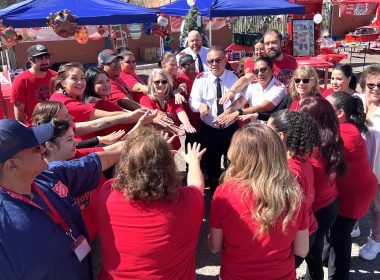by Robert Docter –
I want to talk about authenticity and the power of choice.
Many seem to live in a constant state of high anxiety — a pervasive feeling of unease that for a significant number becomes disease. Without any supporting evidence, they make gigantic assumptions about themselves in their world. For some doubt invades their faith. This frightens them. Instead of confronting their doubt openly and learning from it, they deny it, hide it and suffer from it. With many others and for many different reasons, they live inauthentically.
Those who choose this path often feel very lonely. They feel empty and lost–terrified when alone. Their social roles seem determined by some unwritten screen play in which they are but marionettes whose strings are pulled by some invisible force. They recognize deep in the back of their minds that life is limited and fragile. This reality of death frightens them. They feel out of control.
They believe and accept as true that there are many things they can’t do, many experiences they can’t have. They refuse even to examine the possibility of such experiences. They label themselves “shy” or “only average” or “unattractive,” or “unfit” or “uncreative” or “unlikeable” or “minimally competent.” They have gathered that they need to assume responsibility for the direction of their lives, but this scares them. In their fear they try to reject the notion of this responsibility, and it adds guilt to the anxiety mix. They seem to be without a central core, often without much ethical or spiritual sensitivity, without awareness of the values they use to guide their moral decisions. They resist anything that makes them feel vulnerable, and if someone invades their space they get very defensive. They feel detached from others, cut off, isolated. This reduces their anxiety and causes them to resist change
In short, they live life inauthen-tically–refusing to accept responsibility for the choices they make. We live our lives authentically to the degree we accept responsibility for our awareness of the measures we use to limit our own freedom.
Authentic freedom is not synonymous with license. It’s not “doing your own thing.” Those who allow their urges and desires to run rampant across the screen of their world are only cartoon characters–mere caricatures of an authentic existence. In their quest to answer the question “Who am I? ” they refuse to deal with the more mature demands of the question: “Who are we?” Their life goals seem to be defined by the great god “pleasure” and sacrificed on the altar of “self centeredness.” They don’t realize that realistic limitations exist within a world populated by more than a single person.
Those who choose to live their lives authentically are able to respond to situations rather than simply react. They reflect on the effect of a choice on themselves and others. They resist impulsive behavior.
When we live authentically, we make rational choices based on values to which we are fully committed. Sadly, most of us have only a shallow awareness of those values. Often, they lurk in the background to guide some major decision, but their shallowness does not allow for consistent commitment.
Those who seek an authentic existence are willing to take sensible risks. They stretch themselves and challenge the “I can’t” assumptions. With this courage they learn to assemble choices and examine alternatives. They have an intention to grow. They recognize their potential. They define their talents. They subdue their anxiety, and they act. They know the values they choose to live by and they are able to figure out how to act on them.
The people who live life authentically do so in every dimension of their existence. Physically, they seek healthy living. They avoid harmful behavior. Socially, they relate positively and have a strong and consistent moral compass. They sense their feelings and are able to express them appropriately. They keep their minds active and working. They seek spiritual growth and find it to be a source of meaning. Bing Crosby sang You can be better than you are…He sang it to all of us.











